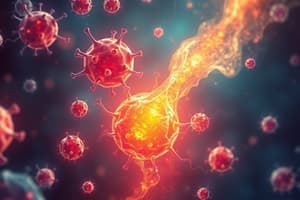Podcast
Questions and Answers
Which chemicals play crucial roles in regulating vascular permeability, smooth muscle contraction, and blood flow changes during inflammation?
Which chemicals play crucial roles in regulating vascular permeability, smooth muscle contraction, and blood flow changes during inflammation?
- Arachidonic acid metabolites
- Cytokines
- Vasoactive amines (correct)
- Reactive oxygen species
Which chemical mediator increases vascular permeability to allow immune cells to enter damaged tissues?
Which chemical mediator increases vascular permeability to allow immune cells to enter damaged tissues?
- Nitric oxide
- Interferons
- Serotonin (correct)
- Dopamine
What type of proteins are involved in cell signaling and coordinating communication within the immune system during inflammation?
What type of proteins are involved in cell signaling and coordinating communication within the immune system during inflammation?
- Nitric oxide
- Reactive oxygen species
- Cytokines (correct)
- Arachidonic acid metabolites
Which of the following can regulate immune cell proliferation and activate other components of the immune system?
Which of the following can regulate immune cell proliferation and activate other components of the immune system?
What are histamine, serotonin, dopamine, and noradrenaline examples of in the context of inflammation?
What are histamine, serotonin, dopamine, and noradrenaline examples of in the context of inflammation?
Which chemical mediator is responsible for inducing fever during inflammation?
Which chemical mediator is responsible for inducing fever during inflammation?
Which compounds modulate various aspects of inflammation, like pain, fluid leakage, and blood vessel dilation?
Which compounds modulate various aspects of inflammation, like pain, fluid leakage, and blood vessel dilation?
Which enzymes mediate the production of Arachidonic Acid metabolites during inflammation?
Which enzymes mediate the production of Arachidonic Acid metabolites during inflammation?
Which enzyme catalyzes the rapid acceleration in oxygen consumption leading to the generation of Reactive Oxygen Species (ROS)?
Which enzyme catalyzes the rapid acceleration in oxygen consumption leading to the generation of Reactive Oxygen Species (ROS)?
Which cells produce Reactive Oxygen Species (ROS) when exposed to leukotriene B4?
Which cells produce Reactive Oxygen Species (ROS) when exposed to leukotriene B4?
Which molecule acts as both a neurotransmitter and a potent vasodilator?
Which molecule acts as both a neurotransmitter and a potent vasodilator?
Which gas helps lower blood pressure, inhibit platelet aggregation, and reduce inflammation?
Which gas helps lower blood pressure, inhibit platelet aggregation, and reduce inflammation?
Flashcards
Inflammation
Inflammation
A physiological response to injury or infection involving immune and healing processes.
Chemical Mediators
Chemical Mediators
Substances that influence the inflammatory response and help regulate immune activity.
Vasoactive Amines
Vasoactive Amines
Compounds like histamine and serotonin that affect vascular functions during inflammation.
Histamine
Histamine
Signup and view all the flashcards
Cytokines
Cytokines
Signup and view all the flashcards
Interleukins
Interleukins
Signup and view all the flashcards
Arachidonic Acid
Arachidonic Acid
Signup and view all the flashcards
Reactive Oxygen Species (ROS)
Reactive Oxygen Species (ROS)
Signup and view all the flashcards
Nitric Oxide
Nitric Oxide
Signup and view all the flashcards
Cyclooxygenase (COX)
Cyclooxygenase (COX)
Signup and view all the flashcards
Balance of Mediators
Balance of Mediators
Signup and view all the flashcards
Therapeutic Targets
Therapeutic Targets
Signup and view all the flashcards
Study Notes
Chemical Mediators & Regulators of Inflammation
Inflammation is a complex physiological response of the body to injury or infection. It involves the release of various chemical mediators and regulators that help control the immune response and promote tissue repair. This article will discuss some key players in the inflammatory process: vasoactive amines, cytokines, arachidonic acid metabolites, reactive oxygen species (ROS), and nitric oxide.
Vasoactive Amines
Vasoactive amines, including histamine, serotonin, dopamine, and noradrenaline, play crucial roles in inflammation. They mediate vascular permeability, smooth muscle contraction, and blood flow changes. For example, histamine increases vascular permeability, allowing immune cells to enter damaged tissues. Dopamine, noradrenaline, and serotonin typically cause vasoconstriction, which reduces blood flow, lowers edema formation, and thus mitigate inflammation.
Cytokines
Cytokines are signaling proteins involved in cell signaling, particularly those responsible for the inflammatory response. They are produced by various immune cells and act as messengers, coordinating communication among different parts of the immune system. Examples include interleukins (IL-1 through IL-10), tumor necrosis factor-alpha (TNF-α), and interferons (IFNs). Some cytokines induce fever, while others regulate immune cell proliferation and activate other components of the immune system.
Arachidonic Acid Metabolites
Arachidonic acid (AA) is a long-chain polyunsaturated omega-6 fatty acid that serves as a precursor for prostaglandins, thromboxanes, prostacyclin, and leukotrienes. These compounds modulate various aspects of inflammation, like pain, fluid leakage, and blood vessel dilation. Mediated by cyclooxygenase (COX) and lipoxygenase (LOX) enzymes, AA metabolites contribute to the protective effect during an inflammatory episode.
Reactive Oxygen Species (ROS)
Reactive oxygen species (ROS) are unstable molecular compounds containing oxygen-derived free radicals or non-radical derivatives. ROS can be generated by phagocytes (white blood cells) during the respiratory burst, a rapid acceleration in oxygen consumption catalyzed by NADPH oxidase, upon encountering certain bacteria or microorganisms. ROS are also produced by endothelial cells exposed to leukotriene B4. Their purpose includes contributing to host defense and wound healing.
Nitric Oxide
Nitric oxide (NO) is a reactive gas that acts as both a neurotransmitter and a potent vasodilator. Produced from L-arginine by nitric oxide synthases (NOS), it helps lower blood pressure, inhibit platelet aggregation, and reduce inflammation. NO has significant implications in atherogenesis, angiogenesis, and myocardial infarction.
The balance of these various chemical mediators and regulators is crucial to ensure proper inflammatory responses without causing excessive damage. Enhanced understanding of these interactions may inform the design of targeted therapies aimed at resolving inflammation effectively, minimizing side effects, and ensuring better outcomes for patients.
Studying That Suits You
Use AI to generate personalized quizzes and flashcards to suit your learning preferences.
Description
Test your knowledge on the key players in inflammation, including vasoactive amines, cytokines, arachidonic acid metabolites, reactive oxygen species, and nitric oxide. Explore their roles in immune response modulation, vascular permeability, and tissue repair.




